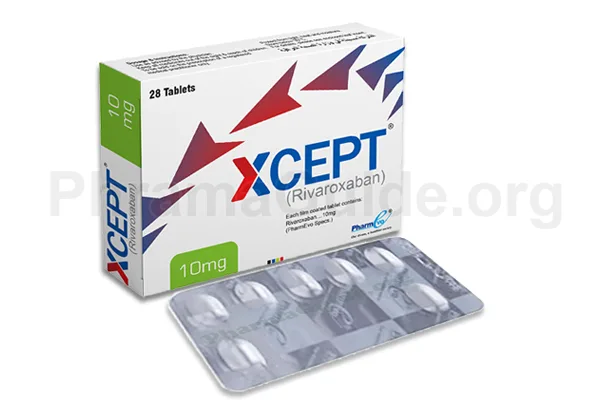Xcept tablet is a prescription medication used to treat and prevent blood clots. It belongs to a class of drugs called anticoagulants (blood thinners). Xcept prevents the formation of blood clots or reduces the risk of existing clots growing larger and causing serious complications. Following are some common uses of Xcept Tablet:
- Prevention of Deep Vein Thrombosis (DVT) and Pulmonary Embolism (PE): Xcept tablet is used to prevent blood clots in individuals who are at risk of developing DVT and PE. These conditions typically occur after surgery, especially orthopedic procedures like hip or knee replacement surgery.
- Treatment of DVT and PE: Xcept tablet is also used to treat existing cases of DVT and PE. It helps prevent the growth of blood clots and reduces the risk of recurrent events.
- Prevention of Stroke in Atrial Fibrillation: Xcept tablet is also used for the prevention of stroke and systemic embolism in patients with nonvalvular atrial fibrillation (a type of irregular heartbeat) who have an increased risk of stroke.
- Prevention of Recurrent Cardiovascular Events: In individuals who have had a recent acute coronary syndrome (ACS), such as a heart attack or unstable angina, Xcept tablets may be used in combination with antiplatelet therapy (such as aspirin) to reduce the risk of recurrent cardiovascular events.
- Extended Prevention of Venous Thromboembolism: After completing an initial treatment for DVT or PE, Xcept tablets can be used for extended therapy to prevent the recurrence of venous thromboembolism.
Off-label Uses of Xcept Tablet
- Treatment of Cancer-Associated Thrombosis: Xcept tablet is used off-label in the treatment of thromboembolic events in cancer patients. It has potential effectiveness in certain cancer-related thrombotic conditions.
- Thromboprophylaxis in Non-Orthopedic Surgeries: While Xcept is commonly used for thromboprophylaxis in orthopedic surgeries. It can also used in non-orthopedic surgeries to prevent venous thromboembolism. This may include surgeries such as cancer surgery or major abdominal surgery.
- Treatment of Superficial Vein Thrombosis (SVT): Superficial vein thrombosis refers to blood clots that form in the superficial veins close to the skin’s surface. Xcept tablets may be effective in the treatment of SVT, particularly when it is associated with risk factors such as varicose veins or thrombophilia.

What is Xcept?
Xcept is one of the leading brands of Rivaroxaban, manufactured and marketed by Pharmevo Pakistan (Pvt) Ltd.
Xcept Alternatives : Other Similar Brands
The following are some alternative brands of Xcept and their manufacturers.
- Rivaxo : Getz Pharmaceuticals (Pvt) Ltd, Pakistan.
- Rivaro : Highnoon Laboratories (Pvt) Ltd, Pakistan.
- Xarelto : Bayer Pakistan (Pvt) Ltd.
- Rivoban : Atco Laboratories (Pvt) Ltd, Pakistan.
- Xaroban : Searle Pakistan (Pvt) Ltd.
- Arixa : Scilife Pharmaceuticals (Pvt) Ltd, Pakistan.
- Rivarox : AGP Pharma (Pvt) Ltd, Pakistan.
- Roxaban : Genetic Pharmaceuticals, Pakistan.
- Ribax : Genix Pharmaceuticals (Pvt) Ltd, Pakistan.
- Rivadon : Don Valley Pharmaceuticals, Pakistan.
Xcept : Available Formulations and Strengths
Presently, Xcept is available in Tablet Form with the following strengths.
Xcept Tablets : 2.5mg, 10mg, 15mg, and 20mg strengths.
Who Should Not Use Xcept?
Xcept has certain contraindications, which are situations or conditions in which the use of Xcept is not recommended due to the potential risks involved.
Hypersensitivity or Allergy: Individuals who have a known hypersensitivity or allergic reaction to Xcept or any of its components should avoid its use.
Active Bleeding: Xcept is an anticoagulant, and its use is contraindicated in patients with active pathological bleeding, such as gastrointestinal bleeding, intracranial hemorrhage, or active ulcerative lesions.
Severe Hepatic Impairment: Xcept is primarily metabolized in the liver, and severe hepatic impairment can significantly affect the drug’s metabolism and clearance. It is contraindicated in patients with severe liver disease or those with coagulopathy related to liver disease.
Pregnancy and Breastfeeding: Xcept is generally not recommended during pregnancy due to the potential risk of fetal harm. It should be avoided in women who are pregnant or planning to become pregnant unless the potential benefits outweigh the risks. Similarly, Xcept is not recommended during breastfeeding, as it may pass into breast milk and potentially harm the nursing infant.
Concomitant Use with Other Anticoagulants: Xcept should not be used in combination with other anticoagulant medications, such as warfarin, heparin, or other direct oral anticoagulants, unless under specific circumstances and close medical supervision.
Known Bleeding Disorders: Xcept should be used with caution in individuals with a known history of bleeding disorders or those at an increased risk of bleeding, such as hemophilia or thrombocytopenia.
What is the Recommended Daily Dosage of Xcept?
Xcept Dose for Prevention of Deep Vein Thrombosis (DVT) and Pulmonary Embolism (PE) after Surgery:
- Hip Replacement Surgery: One Tablet of 10mg once daily, starting 6 to 10 hours after surgery and continuing for 35 days.
- Knee Replacement Surgery: One Tablet of 10mg once daily, starting 6 to 10 hours after surgery and continuing for 12 days.
Xcept Dose for Treatment of DVT and PE:
- Initial Treatment: One Tablet of 15mg twice daily for the first three weeks.
- Followed: One Tablet of 20mg once daily for continued treatment.
Xcept Dose for Extended Treatment to Prevent Recurrence:
- One Tablet of 10mg once daily for long-term treatment.
Xcept Dose for Prevention of Stroke and Systemic Embolism in Atrial Fibrillation:
- One Tablet of 2 mg once daily, with the evening meal.
Xcept Dose for Prevention of Recurrent Cardiovascular Events in Acute Coronary Syndrome:
- One Tablet of 2.5mg twice daily in combination with aspirin or with aspirin plus clopidogrel.
How Xcept Works?
Xcept is a medication classified as a direct oral anticoagulant (DOAC) and belongs to the class of drugs known as Factor Xa inhibitors. Its mode of action is centered around its ability to inhibit the activity of Factor Xa, an essential enzyme in the blood clotting cascade.

Leave A Comment